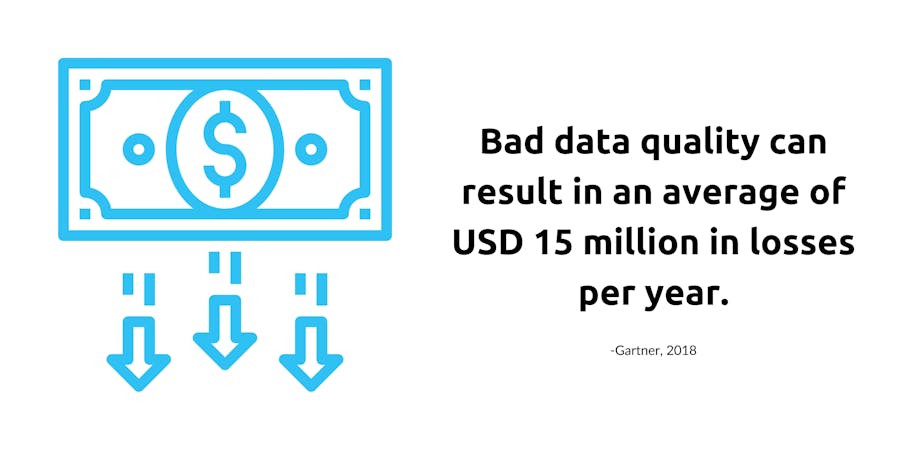The hidden dangers of incomplete data: what financial companies need to know



Are you tired of feeling left behind in the competitive financial services space? Do you struggle to provide your customers with a seamless and differentiated digital experience? The culprit behind these challenges might be simpler than you think: poor data quality.
In today's market, providing an excellent customer experience is essential to stay ahead of the competition. Unfortunately, many financial companies struggle to offer a unified view of their customers, leading to a fragmented customer experience and a terrible work environment for employees. The legacy system compatibility, inconsistent processes, and the need for a differentiated digital experience further compound this issue.
Poor data quality is the root cause of these challenges, and if left unaddressed, it can significantly impact your business. But fear not! The solution to your problems might be simpler than you think. It's time to take control of your data and provide your customers with the unified and seamless experience they deserve.
Numbers speak for themselves
Did you know that poor data quality is not just a minor inconvenience, but it can actually cost your business an arm and a leg? In fact, studies have shown that bad data quality can result in an average of USD 15 million in losses per year. That's right - we're talking about some serious financial damage. Not only can poor data quality reduce efficiency and lower revenue, but it can also drive up your expenses.

Even more surprising is that despite these staggering numbers, only a measly 3% of companies have a formal data quality strategy in place. This means that the vast majority of businesses are not taking a proactive approach to addressing this issue.
Bad data harm
Bad data quality can disrupt the entire workflow of a financial company, affecting multiple departments and leading to a wide range of issues that can ultimately affect the business's bottom line. Here are some examples:
Customer experience:
Regarding customer experience, bad data quality can be a nightmare for financial companies. Imagine a customer contacting a company for help, but their contact information is incorrect or incomplete. The customer may be directed to the wrong department, leading to a frustrating experience that could have been easily avoided.
For instance, if a customer applies for a loan online and is then contacted by a representative who is not aware of the online application, it can cause confusion and frustration for the customer. Similarly, a customer receiving an offer for a credit card they have already applied for can result in a negative customer experience and damage the bank's reputation. Inaccurate or outdated data can also lead to customers receiving irrelevant product or service recommendations, making them feel like the bank doesn't understand their needs or preferences.
Customers expect a seamless experience across all channels. However, good data quality can result in a cohesive customer experience, where customers receive irrelevant messages that do not pertain to their needs. This can ultimately lead to a loss of trust and loyalty from customers. It's important for financial companies to proactively address this issue and ensure that their data is accurate and up-to-date to provide a unified customer experience.
Compliance:
Financial companies must comply with strict regulatory standards to avoid costly fines and potential harm to their reputation. Poor data quality can lead to compliance violations, such as inaccurate transactional data reporting or insufficient documentation. For instance, if a financial company fails to update a customer's address, it may not be able to deliver important regulatory disclosures, which could lead to legal repercussions.
Imagine that a financial company failed to update a customer's address in their database, and they ended up sending important regulatory disclosures to the wrong address. The customer never received the disclosures, and the company didn't realize the mistake until they were audited by regulatory authorities. Messy, isn't it?
As a result, the company faced big fines and their reputation was tarnished. The company realized the importance of maintaining accurate data and implemented a data quality management system to prevent similar incidents from happening in the future.
Risk management:
Managing and mitigating risks is critical to financial companies' operations to maintain their financial stability and performance. Poor data quality can make identifying and managing potential risks challenging. For example, if a financial institution has incomplete or inaccurate data regarding a customer's creditworthiness, it may approve a loan with a high default risk.
To illustrate, suppose a bank has incomplete information on a customer's employment history, credit score, and outstanding debts when evaluating their loan application. As a result, the bank may approve the loan despite the customer's high risk of defaulting. If the customer fails to repay the loan, the bank may suffer significant financial losses, negatively impacting its financial stability and performance.
Decision-making:
Accurate data is critical to financial companies' decision-making processes, from product development to risk management. Poor data quality can lead to incorrect decisions that adversely affect company performance. For instance, if a financial company uses outdated or inaccurate data to assess the performance of a product, it may make incorrect decisions about marketing or pricing, resulting in lost revenue.
To illustrate, consider a financial institution that relies on outdated data to develop a new product that is no longer in demand. As a result, the product fails to generate significant revenue, leading to financial losses for the company.
Similarly, suppose a bank uses incorrect data to set loan interest rates. In that case, they may approve loans with unfavorable terms for the customer, leading to lower customer satisfaction and, potentially, a decrease in business.
Operational efficiency:
Inefficient processes here and there. Manual data entry or duplicate records lead to wasted time and resources and increased costs for financial companies. For instance, if a financial institution has multiple systems storing customer data, it may have to spend additional time and resources consolidating the data manually, reducing efficiency and productivity.
Imagine a bank's customer data is spread across multiple systems, making it difficult to access and consolidate into a single database. As a result, bank employees may have to spend hours manually entering customer data, leading to a loss of productivity, increased errors, and higher costs.
No company wants that.

A seamless solution
Data is the foundation of any successful financial business. However, poor data quality can hold back financial companies in various ways, including compliance violations, reputational damage, and inefficient operations. That's why financial companies must prioritize data quality management and employ skilled professionals to ensure accurate data entry and compliance with regulatory standards.
Fortunately, complete solutions are available to tackle these challenges through clean data. With a systematic approach that includes data cleansing, profiling, standardization, and governance, businesses can improve data quality and overcome the challenges of providing a unified customer experience, achieving digital transformation, and staying ahead of the competition.
One approach is to create a unified customer experience across all business lines using Salesforce technology. With real-time data views and 360-degree visibility of every customer in Salesforce, financial companies can increase employee satisfaction while offering customers fast and seamless omnichannel services.
In summary, data cleansing is one of the solutions to improve data quality, and financial companies should prioritize data quality management to streamline their operations and reduce inefficiencies. By doing so, they can make informed decisions based on accurate data, leading to better performance and customer satisfaction. With the right tools and strategies in place, financial companies can avoid negative consequences and drive sustainable business growth.








